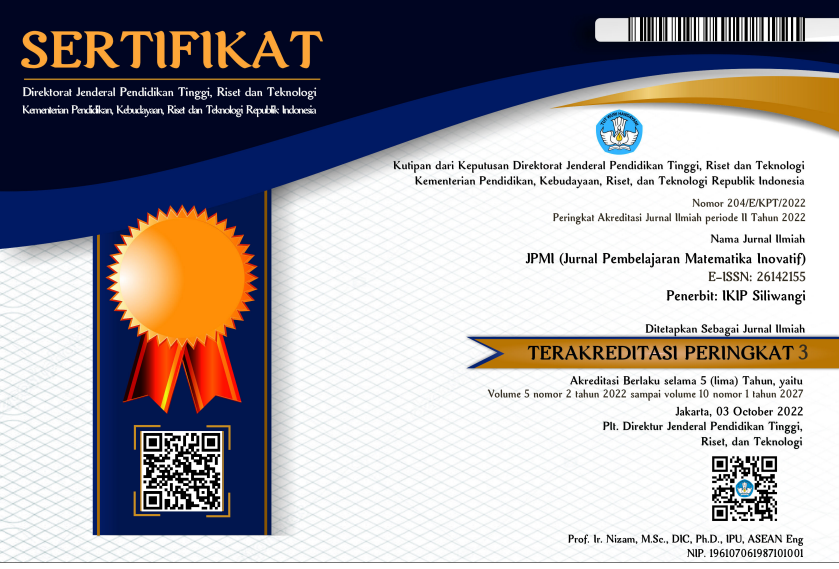Stimulasi kemampuan komunikasi matematis siswa SMP menggunakan pendekatan realistic mathematics education untuk mendukung profil pelajar pancasila
DOI:
https://doi.org/10.22460/jpmi.v8i1.24430Keywords:
Mathematical Communication Skill, Realistic Mathematics Eduction (RME), Project for Strengthening Pancasila Student ProfilesAbstract
This research aims to stimulate mathematical communication skills in statistics for junior high school students using a realistic mathematics education approach to support the Pancasila student profile. In this research, the researcher chose a quasi-experimental research method. The population in this study were all class VIII students in one of the junior high schools in the city of Bandung, and two classes were used as research samples selected by purposive sampling. The first class was made into an experimental class using the RME approach. The second class was used as a control class whose learning used ordinary learning. The results of this study show that 1) There is a positive correlation between the Pancasila student profile and mathematical communication skills in experimental class students, this is because the mutual cooperation dimension in P5 emphasizes communication skills. 2) students' mathematical communication skills increase from the low category to the high category. 3) the students' characters are more similar to Pancasila students after being taught mathematics with a realistic approach.
References
Amin, S. M. (2022). Sumbangsih pembelajaran matematika dalam mengembangkan karakter pelajar pancasila. Repository Universitas Nahdlatul Ulama Surabaya. https://repository.unusa.ac.id/6717/1/Sumbangsih%20Pembelajaran%20Matematika%20Dalam%20Mengembangkan%20Karakter%20Pelajar%20Pancasila.pdf
Hidayat, W., Jayanti, K., Nurismadanti, I. F., Akbar, M. Z. I., Pertiwi, K. A., & Rengganis, P. (2019). Pembelajaran RME (Realistic Matematics Education) terhadap kemampuan berpikir kreatif matematik pada siswa SMP. JPMI (Jurnal Pembelajaran Matematika Inovatif), 2(1), 41–50. https://doi.org/https://doi.org/10.22460/jpmi.v2i1.p41-50
Hidayat, W., & Sumarmo, U. (2013). Kemampuan komunikasi dan berpikir logis matematika serta kemandirian belajar. Delta-Pi: Jurnal Matematika Dan Pendidikan Matematika, 2(1). https://doi.org/10.33387/dpi.v2i1.94
Hodiyanto, H. (2017). Kemampuan komunikasi matematis dalam pembelajaran matematika. AdMathEdu, 7(1), 9–18. http://journal.uad.ac.id/index.php/admathedu/article/view/7397/3690
Juliani, A. J., & Bastian, A. (2021). Pendidikan karakter sebagai upaya wujudkan pelajar pancasila. Prosiding Seminar Nasional Program Pascasarjana Universitas PGRI Palembang, 257–265. https://jurnal.univpgri-palembang.ac.id/index.php/Prosidingpps/article/view/5621
Kanastren, O. R., Bintoro, H. S., & Zuliana, E. (2018). Pendekatan RME berbantuan alat peraga manipulatif untuk meningkatkan kemampuan komunikasi matematis siswa kelas V SD Sambiroto. Journal of Medives: Journal of Mathematics Education IKIP Veteran Semarang, 2(2), 195–204. https://e-journal.ivet.ac.id/index.php/matematika/article/view/609
Kemdikbud. (2019). Hasil PISA Indonesia 2018: akses makin meluas, saatnya tingkatkan kualitas. Kementrian Pendidikan Dan Kebudayaan. https://www.kemdikbud.go.id/main/blog/2019/12/hasil-pisa-indonesia-2018-akses-makin-meluas-saatnya-tingkatkan-kualitas
Napitu, U., Haloho, B., Arent, E., Napitu, R., Purba, I. G., & Girsang, S. (2024). Sosialisasi implementasi proyek penguatan profil pelajar pancasila (P5) bagi peserta didik SMP Negeri 2 Tanah Jawa. Jurnal Pengabdian Masyarakat Sapangambei Manoktok Hitei, 4(1), 34–42. https://doi.org/10.36985/jpmsm.v4i1.1173
NCTM. (2016). Communicating in the math classroom. https://www.nctm.org/Publications/MTMS-Blog/Blog/Communicating-in-the-Math-Classroom_-Part-1/
Pertiwi, C. M., Fitriani, T., & Afrilianto, M. (2018). Relasi antara kemampuan pemecahan masalah matematik dan keaktifan belajar matematik siswa Smp yang menggunakan pendekatan realistic mathematic education berbantuan geogebra. JPMI (Jurnal Pembelajaran Matematika Inovatif), 1(4), 513–524. https://doi.org/https://doi.org/10.22460/jpmi.v1i4.p513-524
Septian, R., Irianto, S., & Andriani, A. (2019). Pengembangan lembar kerja peserta didik (LKPD) matematika berbasis model realistic mathematic education. Jurnal Educatio FKIP UNMA, 5(1), 59-67 https://doi.org/https://doi.org/10.31949/educatio.v5i1.56
Silvianti, R., & Bharata, H. (2016). Meningkatkan kemampuan komunikasi matematis siswa melalui pendekatan realistic mathematics education. Publikasi Ilmiah UMS, 722-729 http://hdl.handle.net/11617/7016
Tanjung, H. S., & Nababan, S. A. (2019). Pengembangan perangkat pembelajaran berbasis masalah untuk meningkatkan kemampuan pemecahan masalah dan komunikasi matematis siswa SMA Negeri 3 Kuala Kabupaten Nagan Raya. Genta Mulia: Jurnal Ilmiah Pendidikan, 10(2), 178-187. https://garuda.kemdikbud.go.id/documents/detail/1276944
Widhi, T. A. (2022). Peningkatan pemahaman konsep menguraikan dan menyusun bilangan dengan metode matematika realistik dalam pengembangan kurmer di kelas I SDN Bendogerit 2 Kota Blitar. EDUKASIA: Jurnal Pendidikan Dan Pembelajaran, 3(3), 653–660. https://doi.org/https://doi.org/10.62775/edukasia.v3i3.175
Wijayanti, R. (2023). Penerapan model pembelajaran project based learning untuk meningkatkan profil pelajar pancasila dimensi bernalar kritis dan kreatif siswa kelas IV [Universitas Negeri Semarang]. http://lib.unnes.ac.id/id/eprint/62073
Zalukhu, B., Napitu, U., Zalukhu, Y., & Hulu, N. S. (2023). Pengaruh proyek penguatan profil pelajar pancasila terhadap pembentukan karakter dan moral peserta didik di sekolah menengah pertama. Innovative: Journal Of Social Science Research, 3(6), 2102–2115. https://doi.org/https://doi.org/10.31004/innovative.v3i6.6394.
Downloads
Published
Issue
Section
License

This work is licensed under a Creative Commons Attribution-ShareAlike 4.0 International License.
The author is responsible for acquiring the permission(s) to reproduce any copyrighted figures, tables, data, or text that are being used in the submitted paper. Authors should note that text quotations of more than 250 words from a published or copyrighted work will require grant of permission from the original publisher to reprint. The written permission letter(s) must be submitted together with the manuscript.
















